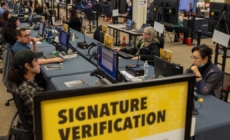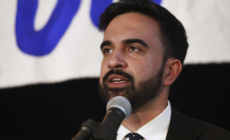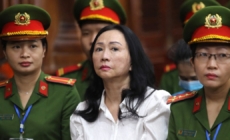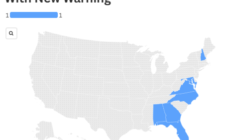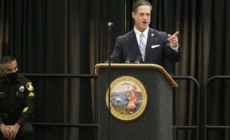-
Orbán: Ukraine’s accession to NATO would immediately result in war with Russia - 9 mins ago
-
Justice Department sues O.C. registrar for noncitizen voting records - 27 mins ago
-
Top Andrew Cuomo Donor Didn’t Even Rank Him First In NYC Primary - 38 mins ago
-
Yankees vs. Reds Highlights | MLB on FOX - 44 mins ago
-
Vietnam to remove death penalty for embezzlement, sparing tycoon’s life - 50 mins ago
-
Chocolates Recall Map Shows States With New Warning - about 1 hour ago
-
Phillies vs. Astros Highlights | MLB on FOX - about 1 hour ago
-
Jaxson Dart Makes Noteworthy Leap on NY Giants’ Depth Chart - 2 hours ago
-
Blue Jays vs. Guardians Highlights | MLB on FOX - 2 hours ago
-
Groundbreaking discovery made about massive icy comet hurtling through deep space - 2 hours ago
Federal Reserve Chair Jerome Powell reiterated his view that the central bank should keep interest rates steady for now, citing inflation risks from U.S. tariffs.
Powell, who made his remarks in prepared testimony Tuesday before the House Committee on Financial Services, has been under pressure from President Trump to cut rates, which would make it cheaper for consumers and businesses to borrow money. At its June 18 meeting, the Fed maintained its benchmark rate in a range of 4.25% to 4.5%, where it’s been parked since December.
In his semiannual testimony, Powell cited uncertainty over the impact of the Trump administration’s tariffs, noting that any resulting inflation “could be short lived” or “could instead be more persistent.” So far, data tracked by the Fed shows that tariffs have had little impact on overall consumer prices.
By contrast, the U.S. labor market is showing signs of a slowdown, prompting some Fed officials to signal it could be time to cut rates. But Powell reiterated his previous stance that it would be premature to push down borrowing costs for consumers and businesses.
“For the time being, we are well positioned to wait to learn more about the likely course of the economy before considering any adjustments to our policy stance,” Powell said in the testimony.
He added that tariffs are likely to weigh on economic activity and that the Federal Reserve’s goal is to ensure that any tariff-related price increases don’t become “an ongoing inflation problem.”
Powell is “unbending under pressure,” noted Sal Guatieri, senior economist at investment advisory firm BMO, in a research note. “Powell needs more data to assess whether tariffs will have a greater negative impact on growth/ labor markets or on inflation, and whether any lift to the latter will be temporary or longer-lasting should it influence expectations.”

